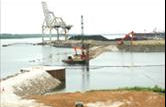Panel issues cleanup caution
By Tanya Collier Macdonald
Cape Breton Post
Fri., July 14, 2006
Sydney - Proceed with a multitude of cautions, recommends a three-member panel in its highly complex and thorough report assessing cleanup plans for the tar ponds.
Now available for public perusal, the Joint Review Panel Environmental Assessment Report gives a yellow light to the Sydney Tar Ponds Agency’s plan to encapsulate the tar ponds and coke oven sites if it removes and destroys most PCBs. However, further studies and assessments should be undertaken before the project proceeds.
In a summary of its conclusions, the panel warns if government ministers approve encapsulation for the sites, the agency and regulators should be prepared to manage the tar ponds containment system indefinitely. And, before the cement is poured, the panel recommends studies be done to prove the tar ponds’ organically enriched sludge can be satisfactorily solidified and stabilized.
It’s also urging governments to weigh the "relative merits" of removing PCBs from the ponds versus keeping them in place, as outlined in the federal government’s Toxic Substances Management Policy.
"The panel was told that requirements of this risk benefit assessment have only been partly met and concludes that the results of a complete assessment, including a comparison of risks and benefits to both human health and the environment, may indicate that the ‘full containment, no incineration’ alternative be put forward by (the agency) would be a better approach than employing incineration," wrote the panel.
Ron Marman, a Grand Lake Road resident who faithfully attended three weeks of panel hearings in Sydney in May, said he was hoping for a clear rejection of incineration from the joint review panel.
"I would say that if incineration goes ahead after everything that they heard at the panel hearings, that the government has no respect for the feelings of the people in this community," said Marman. "That would say to me we better start looking at another government that will listen to the people. I think government has a responsibility to be economically viable with our money and not go spending it where they don’t have to. We’re talking $70 million that would be wasted."
The agency has stated that removing incineration from the plan would reduce project costs by $70 million. Currently, governments agree to allocate up to $400 million in funding to remediate the sites.
Another panel recommendation is to bring future site uses to the forefront when government considers the final cleanup.
"The panel understands that the future uses of two sites is not part of the project but has concluded that ensuring that the sites have the capacity to support viable and sustainable uses must be an integral part of the project design," the panel wrote.
Gordon Harris, senior communications adviser for the Canadian Environmental Assessment Agency, said the federal government usually takes about three months to review a panel report before making a final recommendation. However, because of the complexity of the document and the project, it could take longer.
"We expect a government response in the fall," he said.
In the coming days, Public Works and Government Services Canada will create a working group to prepare a response to submit to government in-council for a final cleanup plan and approval.
The joint review panel, with members Lesley Griffiths, William Charles and Louis LaPierre, will continue to exist until governments give the green light.
The Sydney Tar Ponds Agency, which received the report Thursday, is taking time to review the document before commenting on specific recommendations.

Construction of a dam at Battery Point continued Thursday as this community got its first glance at a Joint Review Panel Environmental Assessment Report handed to governments late Wednesday. The panel recommends provincial and federal environment ministers approve the project with conditions, which are detailed in the panel’s 177-page document.
|
tcmacdonald@cbpost.com
|
